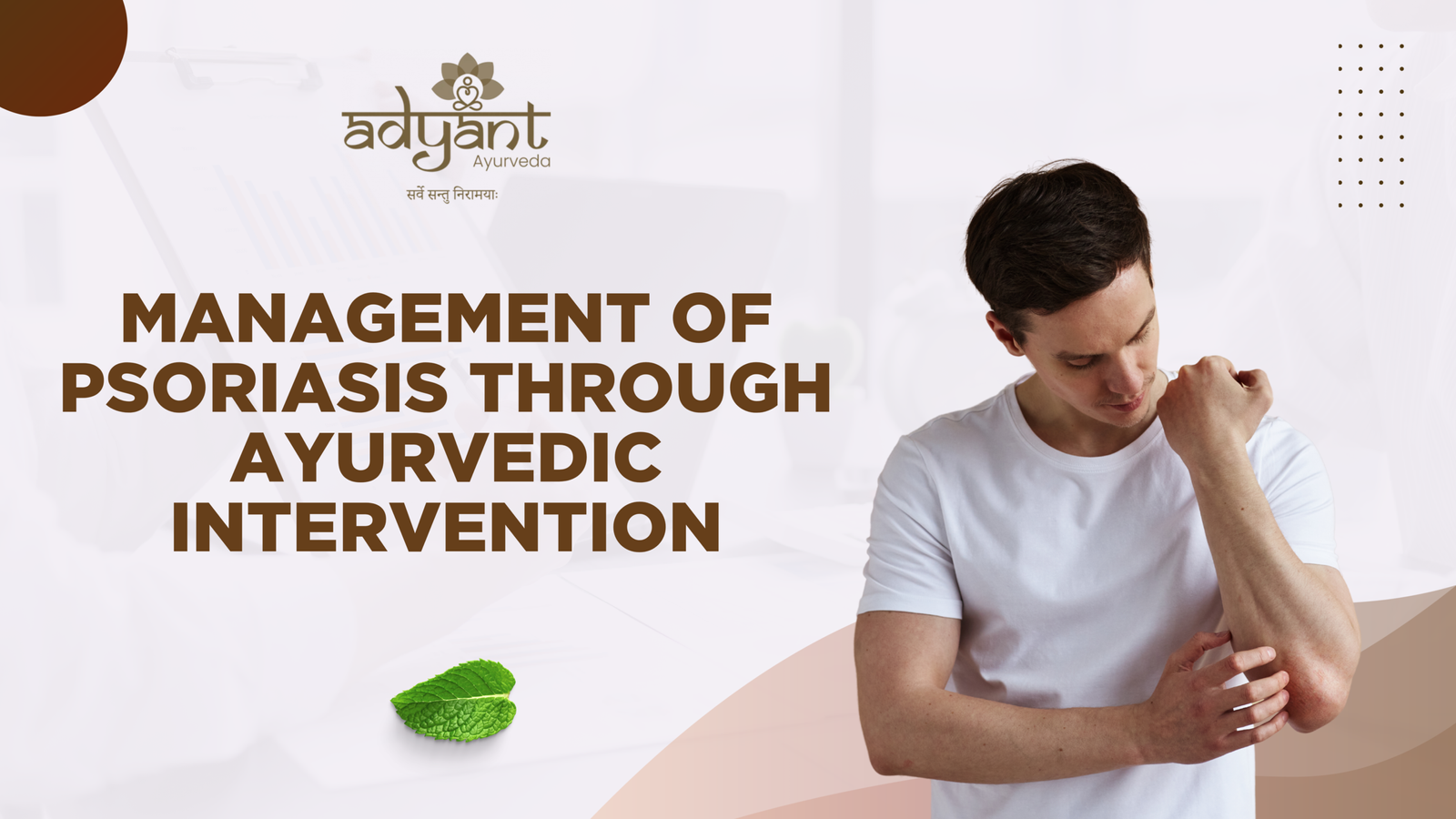Author: Dr. Vidya, BAMS – Ayurvedic Physician, Adyant Ayurveda, Bangalore
ABSTRACT
Psoriasis is a chronic, non-communicable, proliferative autoimmune skin disorder affecting 2–3% of the global population. It is characterized by hyperkeratinisation and sharply defined erythemato-squamous plaques. In Ayurveda, psoriasis corresponds to Kitibha Kushta, one of the Kshudra Kushta, presenting with Shyava Varna (blackish-brown discoloration), Kinakhara Sparsha (rough touch), Parushatva (hardness), and Kandu (itching).
Management of Kitibha Kushta involves both Shodhana (purification therapy) and Shamana (palliative therapy). This case study highlights the effective role of Ayurvedic interventions, including Takradhara and internal medications, in managing psoriasis, demonstrating safe, holistic, and patient-centric care.
Keywords: Psoriasis, Kitibha Kushta, Ayurveda, Takradhara, Shamana Chikitsa, Adyant Ayurveda, Dr. Vidya
INTRODUCTION
Psoriasis is a chronic autoimmune skin disorder that significantly affects the patient’s quality of life due to persistent itching, scaling, and bleeding lesions. Modern medicine primarily focuses on symptomatic relief, often with potential side effects and risk of recurrence.
Ayurveda offers a holistic approach by addressing the root cause of the disorder through a combination of dietary modifications, lifestyle adjustments, internal medicines, and external therapies. Among these, Takradhara has been found to provide remarkable symptomatic relief in Kshudra Kushta, like psoriasis.
This case study was conducted by Dr. Vidya, BAMS, an experienced Ayurvedic physician at Adyant Ayurveda, Bangalore, known for her expertise in managing chronic dermatological disorders.
CASE PRESENTATION
A 67-year-old female patient presented with:
-
Whitish flakes with dry skin over hands, back, and legs.
-
Bleeding on scratching.
-
Severe itching (Kandu).
She had a history of psoriasis for several years, impacting her daily life and comfort.
AYURVEDIC MANAGEMENT
1. Dietary & Lifestyle Modifications
-
Timely and regular meals.
-
Freshly prepared, warm, and easily digestible foods.
-
Cooked vegetables and whole grains.
-
Avoid curd, paneer, deep-fried foods, refrigerated items, cheese, chocolates, sweets, and sour foods.
-
Moderate daily exercise.
-
Avoidance of daytime sleep.
2. Internal Medicines
-
Tiktaka Ghrita – 2 tsp on an empty stomach (morning).
-
Capsule Prunilol – 2 capsules twice daily after food.
-
Atrisor Ointment – topical application.
-
Khadirarishtam – 10 ml twice daily before food.
3. External Therapy (Bahya Chikitsa)
-
Takradhara performed daily from 05/06/2025 to 14/06/2025.
OUTCOME
-
The patient reported 80% improvement in lesions, itching, and scaling within 3 months.
-
No adverse effects or complications were observed.
-
Significant improvement in skin texture, hydration, and overall comfort.
DISCUSSION
Psoriasis management in Ayurveda focuses on balancing Doshas, eliminating toxins, and restoring skin health.
-
Takradhara helps soothe irritated skin, reduce itching, and promote healing.
-
Tiktaka Ghrita and Khadirarishtam help pacify Pitta and Kapha, addressing systemic imbalance.
-
Combined with lifestyle and dietary modifications, these therapies provide a holistic and sustainable approach.
This case demonstrates that Ayurvedic management, especially under expert guidance by Dr. Vidya at Adyant Ayurveda, is highly effective and safe in treating chronic psoriasis.
CONCLUSION
Ayurvedic interventions, particularly Takradhara along with internal medications, offer significant improvement in psoriasis symptoms, with no apparent complications.
This case highlights:
-
The importance of personalized Ayurvedic care.
-
The efficacy of holistic approaches combining internal and external therapies.
-
The potential of Ayurveda as a sustainable treatment modality for chronic autoimmune skin disorders.
REFERENCES
-
Charaka Samhita, Chikitsa Sthana, Kshudra Kushta Adhyaya.
-
Sushruta Samhita, Sutra Sthana, Skin Disorders.
-
Shastri Ambikadutta, Ayurvedic Management of Skin Diseases, 2018.
-
Clinical studies on Takradhara in psoriasis, Journal of Ayurveda and Integrative Medicine, 2020.





